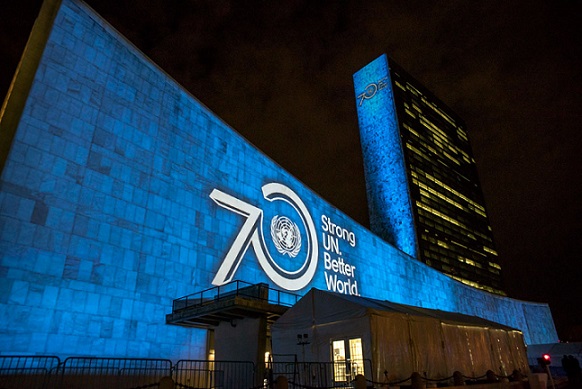
The UN at 70- Will the UN survive another seventy years?
Written by Ulrike Barten, Associate Professor, PhD, LL.M. at Department of Law
It is 2015. The United Nations turn seventy. Time for celebrations? Let’s take stock. What did the UN aim to achieve?
Article 1 of the UN Charter describes the purposes of the UN. They shall maintain international peace and security. The choice of words seems stunning from today’s perspective. “Maintaining” peace presupposes that peace already existed at the time. The Charter was signed on 26 June 1945, after Germany and its European allies had surrendered; however, before the Japanese Empire surrendered. Furthermore, one can surely only speak ofpeace in the sense of the absence of war and not harmonious co-existence and dignity for everyone. Did the UN “maintain” global peace during the Cold War and since then?
Article 1 continues to explain that the UN will take “effective collective measures” for the prevention and removal of threats to the peace. The UN Security Council has been called many names, but effective has not been one of them for a long time (though there are a few examples). True, collective measures have been adopted (thinking recently of South Sudan and Libya); however, regarding the amount of conflicts around the world (thinking just of the Ukraine, Yemen, the conflict between Palestinians and Israelis), these collective measures seem like the proverbial drops in the ocean.
Article 1 states the UN wants to develop friendly relations among nations based on respect for the principle of equal rights and self-determination of peoples. Self-determination remains one of the essential principles of contemporary international law. However, self-determination has probably led to more wars than any other principle of international law. Scotland’s referendum in 2014 is a positive example. If Catalonia will indeed secede from Spain after passing legislation earlier this month remains to be seen. The Spanish Constitutional Court has suspended the Catalan resolution starting the process of secession.
Article 1 also states that an aim is to achieve international cooperation in solving international problems of an economic, social, cultural or humanitarian character. Where to start with the list of failures? The Syrian humanitarian crisis is not solved collectively.


It is 2015. The United Nations turn seventy. Time for celebrations? Let’s take stock. What did the UN aim to achieve? Photo: UN.org
Failures and Successes
Of course, it is easy to be grumpy. After seventy years, the UN, or more specifically the Security Council’s structure is no longer up-to-date. It is easy to find failures. A closer look reveals success as well. The Cold War never erupted and ended relatively peacefully. The Millenium Development Goals may not have been achieved, but the results have nevertheless superseded all expectations, and the post 2015 Sustainable Development Goals are debated positively. So besides the grumbling, acclamations can be heard from time to time.
The UN at 70
The UN itself finds it is important in 2015. Ban Ki-Moon claims the UN remains a viable organization and "when there is a unity of purpose and solidarity among Security Council members, particularly the five permanent members, you can make real things.” The word “when” remains a headache. “When” there is a unity of purpose. Sure, in that case real things can be made. However, how often is there a unity of purpose, particularly among the five permanent members?
In October 2015, the General Assembly adopted resolution 70/3. The resolution reaffirms the common values that go beyond differences of language, culture or religion. The resolution reaffirms the faith in the United Nations and the unfailing commitment to the purposes and principles of the Charter. There is recommitment to fulfil in good faith the obligations assumed under the Charter.
Life or Death
The resolution was adopted by the member states of the United Nations. It was adopted by the same states who wage war against each other and against peoples. It was adopted by the same states that use and abuse their veto power. It was adopted by the same states who do not respect the sovereign equality of states, the territorial integrity of other states, the prohibition of the use of force and the principle of non-intervention. Are they only paying lip-service? It wouldn’t be the first time.
Let’s be naïve and hope that states have learned their lessons. Let’s hope that the UN will emerge stronger than ever from its celebrations. Otherwise, the next thing we will read about the only truly global forum, where issues of peace and security can be tackled, will be an obituary in the newspaper.
Link to this article: http://www.sdu.dk/en/Om_SDU/Institutter_centre/C_CWS/Previous+Blog+Posts+BW#seventy